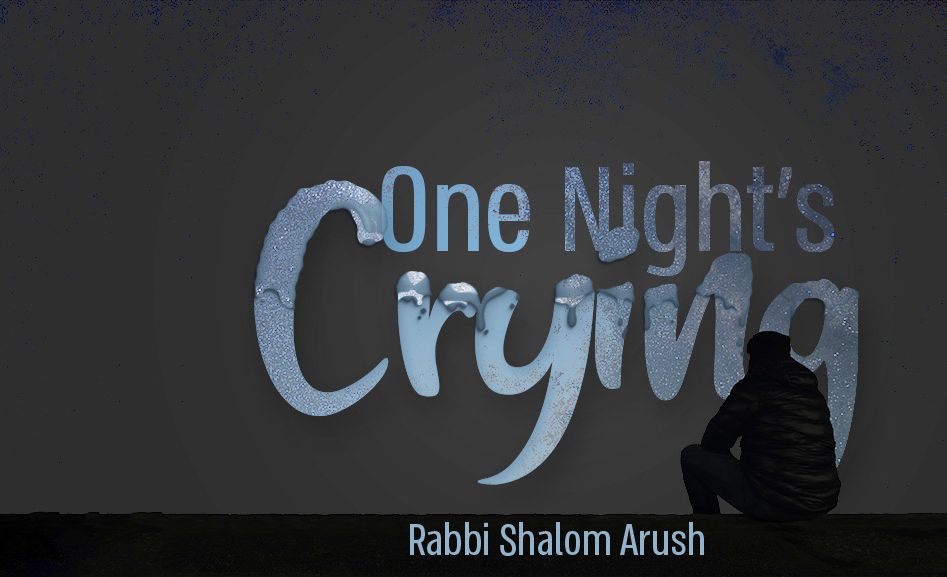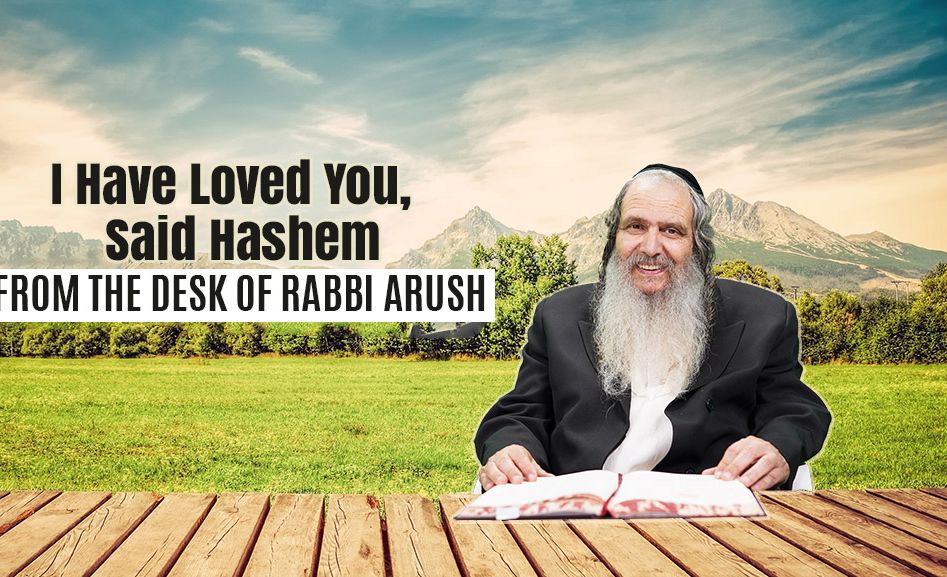
My Prayer
For those who are having difficulty in talking to Hashem, Dr. Zev Ballen gives a set of wonderful guidelines and ideas for personal prayer, ready to try out right now...

I get so many questions from people who want to speak to Hashem but don’t or get easily discouraged because they aren’t sure that they’re doing it the “right” way. Rabbi Arush has published guidelines for personal prayer in his classic book on the subject, In Forest Fields. I’ve been struck by how many of the people who I speak with don’t seem to know that Rabbi Arush’s guidelines for both the content and order of personal prayer is not something that he meant for us follow mechanically. Rather, he offered an “order” in the hope that we would refer to it as a means of finding our own path of communication with Hashem.
In light of the above I decided to share my own personal outline for personal prayer that I compiled based on the writings of Rabbi Arush. Anyone who is familiar with Rabbi Arush’s outline can readily see that my outline does not conform to his and yours doesn’t need to either. Please remember that my guide is also not something than should be strictly adhered to. I myself rarely follow it exactly as it written here. Although I may refer to it quickly before praying, I often find myself jumping back and forth on these topics in completely different ways with different wordings and sometimes leaving out certain subjects entirely while adding others.  My speech is certainly not continuous. I often experience long pauses. I usually speak quietly and occasionally cry out with more force. I am completely non-grammatical and often speak more in short phrases than full sentences. If I perceive any visual imagery I may speak directly to the person, place or subject or event that I am perceiving. Sometimes I speak directly to Rebbe Nachman of Breslev. Spontaneity is the rule of thumb.There are times when I must ignore the following “order” completely and simply speak to Hashem about whatever is weighing heaviest on my heart.
My speech is certainly not continuous. I often experience long pauses. I usually speak quietly and occasionally cry out with more force. I am completely non-grammatical and often speak more in short phrases than full sentences. If I perceive any visual imagery I may speak directly to the person, place or subject or event that I am perceiving. Sometimes I speak directly to Rebbe Nachman of Breslev. Spontaneity is the rule of thumb.There are times when I must ignore the following “order” completely and simply speak to Hashem about whatever is weighing heaviest on my heart.
Anyone who is prone to serious depression and who doesn’t feel any positive emotion, optimism or sense of well-being by the time they complete the first three sections should substitute sections four and five on Confession and Self-improvement with a section on Declaring a New Beginning. I would suggest that the person read what Rabbi Arush wrote about declaring a new beginning in The Garden of Wisdom (it starts on p. 153). Learning about renewal and declaring a new beginning is a powerful antidote for hopelessness and depression. Some people need personalized spiritual coaching to know when and if they should be making this substitution. Almost all of us could use at least one emuna coaching session at some point to be sure we’re on the right track.
Prelude (found in Breslever prayer books)
“I hereby connect myself to all of the righteous Rabbis of this generation and to all of the righteous Rabbis who are resting in the ground. They are so holy in the land. And, I especially wish to connect myself to the righteous one who is the foundation of the world, a flowing brook, the source of wisdom, Rabbi Nachman the son of Simcha the son of Feiga may his merit be a shield for us and for all of Israel, amen.”
1. Praying to Pray Well
a) I Pray to be able to express myself in the way that will be most pleasing to Hashem today.
b) I pray that my words and intentions should be honest and truthful as I stand humbly before my Master’s thrown.
c) I pray that my attitude should not be that I deserve for my requests to be fulfilled. “Please, Lord, remove all traces of entitlement from my heart.”
d) “Help me, my Father to remember how infinitely huge, mighty and awesome You are so that I don’t forget for a second before Who I am standing.
e) I ask that Hashem enlighten me with the subject(s) that He wants me to pray for, atone for, confess to, show appreciation for today. I pray that I don’t waste Hashem’s time or my own by speaking about things that are not His will.
f) I ask Hashem’s help to remember that the main purpose of my praying is to achieve a nullification of my ego, arrogance and my tendency to want to control everything by putting my intellect before my emuna. I must know what Hashem’s will for me is since only Hashem knows my designated path.
g) I pray that I will be able to accept and be satisfied whether or not Hashem answers my prayers right away. Whether He says “yes” or “no” it should all be the same in my eyes. I yearn for Hashem to see my self-nullification, enlighten me with His wisdom and show me my true path.
2. Pray for Emuna
a) I pray to remember that my main connection to Hashem is through emuna and that the main aspect of emuna is that Hashem is Good and wants to bestow good upon me. I pray to truly believe that Hashem’s most defining “characteristics” are His loving-kindness and His mercy.
b) I pray to submit myself to the Truth – my only choice in life is whether to trust in G-d or not.
c) I may ask: “Please Hashem, show me how I can make focusing on emuna an automatic behavioral pattern that will penetrate my mind and my heart.”
d) I want to be able to activate my emuna before my logic in every situation by saying audibly to myself: “This is coming from Hashem and it’s for my ultimate good!”
e) I pray to “believe” before I “understand.” I pray to believe that there is inherent good in everything that happens to me today.
f) Emuna resembles darkness. I must believe in G-d’s goodness which is hidden in the dark.
g) “My “wisdom” and my “knowledge” are the source of my troubles.”
h) Hashem gives me obstacles, failures and setbacks to rid me of the arrogance that the primeval snake instilled into my nature when he said: “And you shall be like G-d.”
i) I must submit to the reality that “I am nothing without Hashem.”
j) “Emuna is the opposite of depression, anxiety, and anger – it leads me to happiness.”
k) If I don’t feel positive emotions yet, I review my list of my good points (I used to carry this list around with me).
3. Express Gratitude
a) Thanking Hashem will strengthen my humility, emuna and happiness.
b) It’s my nature as a Jew to give thanks.
c) I pray to thank Hashem for everything I have since literally everything belongs to Him. Whatever he chooses to gives me is a free gift. Whatever He chooses to withhold from me is also a gift.
d) Giving thanks increases my spiritual awareness.
e) Giving thanks to G-d is the most important element of prayer.
f) I pray to cast logic aside in order to thank Him for my difficulties.
g) Without thanking Hashem I lack Truth since it is the greatest falsehood to not realize that everything that happens to me is for my ultimate benefit.
h) The quality of my relationship to Hashem is determined by how much I express my gratitude to Him.
i) Expressing gratitude enables me, with Hashem’s help, to separate light from darkness, good from bad. I will no longer have to live in the undifferentiated confusing “gray” area that is a mixture of good and bad.
j) Expressing thanks prevents me from going into negativity.
4. Confession and Repentance
a) All of my sins result from the inner arrogance and heresy within me that has been inherent in the human condition since the time of the primeval snake.
b) The root of all my sins is arrogance and a lack of humility.
c) All my sins stem from my not believing that everything that happens to me is for my very best.
d) I try to confess my specific sins before Hashem with as much brutal honesty as I can and from a broken heart if possible.
e) I beg Hashem to not “punish” me with harsh judgments but rather to wipe my slate clean and give me a new life.
f) I ask Hashem to help me right my wrongs by turning my confession into a desire for self-improvement and taking action.
g) I pray for Hashem’s help to continue to repent in the future the very moment that I notice I did something wrong.
h) I want to remember that confession is an aspect of taking care of myself and will strengthen my awareness that everything is for the best.
5. Self-Evaluation and Self-Improvement
a) I must resolve to improve my ways.
b) Ask Hashem: “What personality characteristics do I need to work on and improve.”
c) A person who improves himself or herself will gain a true fear of G-d.
d) A person who improves himself or herself will gain a deeper insight into how Hashem runs the world.
e) A person who is growing spiritually will lose fear of others.
f) In the merit of honest self-appraisal and a desire to improve Hashem will cast aside the accusing angels.
g) Self-improvement leads to the greatest sweetness from Heaven.
6. Pray for The Jewish People
a) I pray that they will return to Hashem.
b) I pray for assimilation to end.
c) I pray that the Jewish people should be saved from whatever difficult situations they may be in and that everyone should have everything that they need.
d) I pray that the Jewish people will start speaking to Hashem 60 minutes a day and come close to the teachings of Rabbi Nachman of Breslev and Rabbi Shalom Arush.
e) I pray for my family, students and friends.
f) I pray for my teachers: Shalom the son of Yamna.
g) I pray that we will all see, in our lifetimes, the entire Jewish nation living peacefully in our land with the coming of our true King and the rebuilding of the final holy temple in Jerusalem. May it come to pass. Amen.











Tell us what you think!
Thank you for your comment!
It will be published after approval by the Editor.